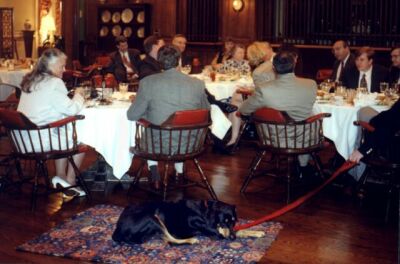
|
The Paula Gordon Show |

|
The Paula Gordon Show |
|
Conversation 1 Charles Brewer tells Paula Gordon and Bill Russell about deciding on core values and beliefs he wanted in a company. When his own experience with the Internet made a "need" apparent, Charles founded MindSpring. He tells how MindSpring is living out his aspirations for a company different than today's business status quo. |
|
Conversation 2 Computers are not all that easy for most people, Charles reminds us, though computers in general and the Internet in particular are a lot easier now than a few years ago. æAnd both are getting better. Charles tells how "MindSpring" got its name. He puzzles over why practically everybody goes to work, eager to do a good job, to make companies better and more effective, but somehow the opposite happens. He gives his theory on the importance of core values and beliefs. He describes MindSpring's two fundamental values: respect for individuals and honest and integrity. æHe shows how other core values and beliefs flow from these two and how all of them directly affect the day-to-day business, particularly in how they hire people. Charles describes how his roles have evolved, from founder to CEO. |
|
Conversation 3 From the very beginning of MindSpring, people in the company have worked from the premise that providing great support to customers is the most critical part of any job and the way to differentiate oneself in the marketplace. Charles gives a sense of the wide reaching impact that attitude has had. He describes how independent ISPs are fundamentally different from traditional telecommunications companies. æHe explains his confidence that MindSpring's advantages as a values-based company outweigh incumbent companies' apparent advantages. Citing the baggage of incumbent companies, he compares their existing infrastructure base with MindSpring's values-base. |
|
Conversation 4 MindSpring's main line product is connectivity and service and support for individuals at home and in small businesses. As the packet-switched Internet-style connection goes into the home with a blossoming of devices hooked up to it, Charles sees MindSpring's job as increasingly challenging and describes those challenges. He cites projections about exponential growth in the pattern of the volume of traffic data passing voice traffic on telecommunications networks and predicts that over time, the circuit switched network is going to wither away. He gives his perspective on the effectiveness and impact of the Telecommunications Act of 1996. He suggests one solution to today's "bottleneck" into the home could be a single company that owns and operates the wires running through your neighborhood, selling access to all comers. He urges people to use cyberspace without relinquishing physical space and speculates about implications for an increasingly information rich world. |
|
Conversation 5 The Internet is spawning dueling concepts of "community," which Charles describes. He stands up for neighborhoods and local merchants. He reminds us of the eternal roles of good and evil, both of which are amplified by the Internet. He sees a time when the very central role the Internet will have on our lives has become normal. He wonders about what, if any, differences there are between how women and men use the Internet. He believes most users can be thought of as recreational or utilitarian and describes both. He predicts challenges for Internet Service Providers. |
|
Conversation 6 Charles reminds us that the Internet is new to everyone, naming the top possible sin at MindSpring: a "you dummy" attitude toward customers. He reassures us that he, too, needs help using the Internet -- regularly. He gives away the secret of how to get a job at MindSpring. Charles recalls what drove him to start his business, what he finds objectionable in today's status quo in business and how he expects MindSpring's core values and beliefs to continue to drive the company into a successful future. |
|
Acknowledgements The Commerce Club made us all welcome, including Louie, the three-legged Rotweiller. We applaud their ecumenical spirit and thank them for their hospitality. We also appreciate the audience who joined us there. MindSpring's Ed Hansen brought all the pieces together to make this program happen. We thank him! |
|
Aditional Links: Charles' e-mail address is charles@mindspring.com |

Louis (the three-legged Rotweiller) and friends discuss the Internet in the Pub at The Commerce Club. |
